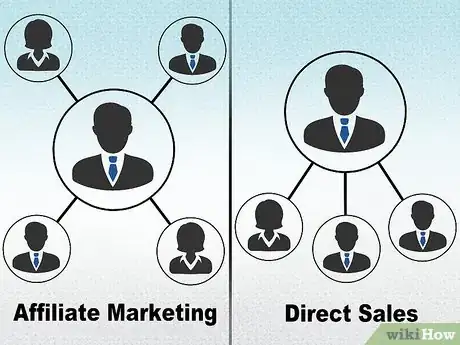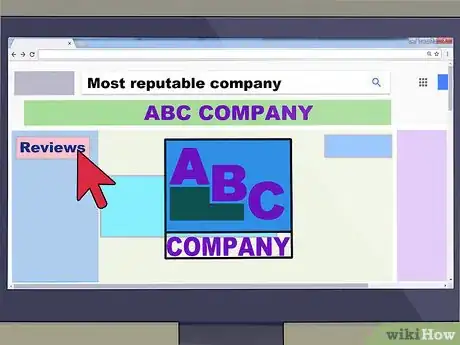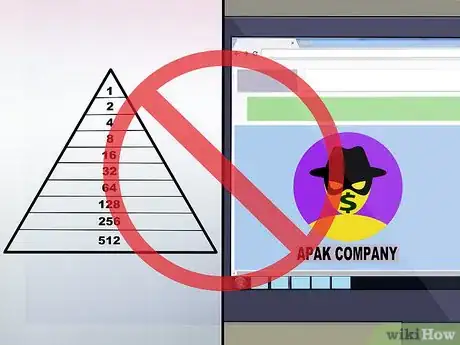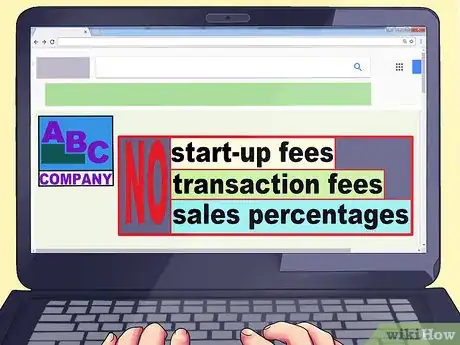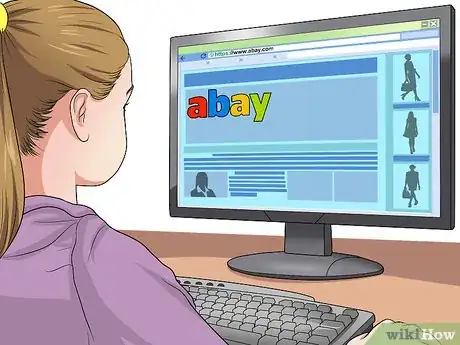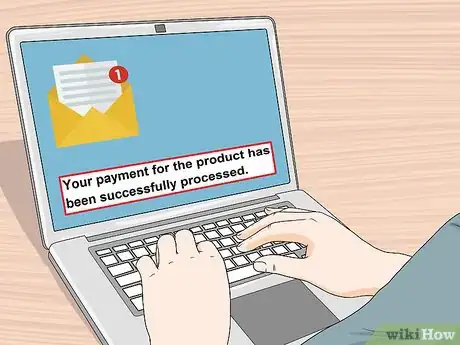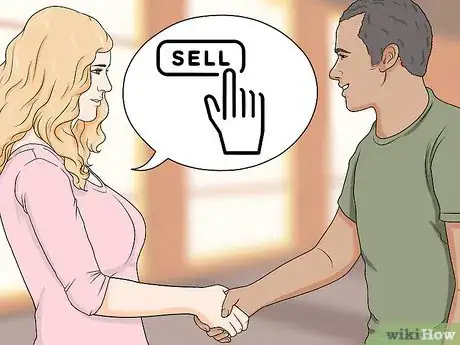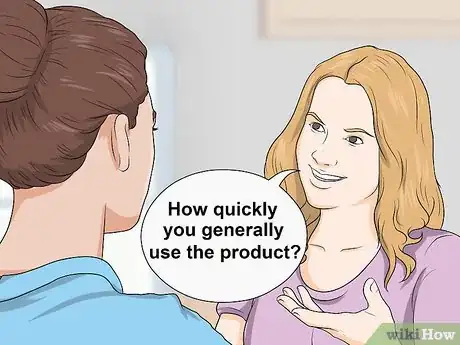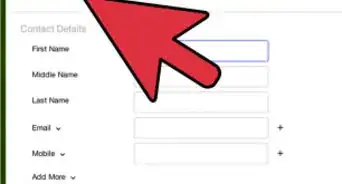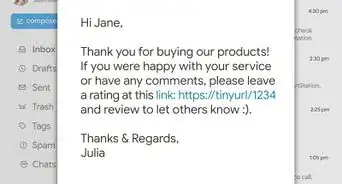This article was co-authored by Christine Michel Carter. Christine Michel Carter is a Global Marketing Expert, Best-Selling Author, and Strategy Consultant for Minority Woman Marketing, LLC. With over 13 years of experience, Christine specializes in strategic business and marketing consulting services including market analysis, organizational alignment, portfolio review, cultural accuracy, and brand and marketing review. She is also a speaker on millennial moms and black consumers. Christine holds a BS in Business Administration and Art History from Stevenson University. She is a leader in multicultural marketing strategy and has written over 100 articles views for several publications, including TIME and Forbes Women. Christine has worked with Fortune 500 clients such as Google, Walmart, and McDonald’s. She has been featured in The New York Times, BBC News, NBC, ABC, Fox, The Washington Post, Business Insider, and Today.
wikiHow marks an article as reader-approved once it receives enough positive feedback. This article received 12 testimonials and 100% of readers who voted found it helpful, earning it our reader-approved status.
This article has been viewed 290,528 times.
Selling products from home can be a great way to earn extra income without committing to the strict hours of traditional employment. If you want to work on a flexible schedule, have independence and autonomy in your work, and get paid based on how successful you are, then selling products may be a good job opportunity for you.
Steps
Choosing a Product or Company
-
1Decide between affiliate marketing and direct sales. Affiliate marketing is essentially selling through advertising without ever having the product in your hands. Direct sales, also known as MLM (Multi-Level Marketing), involves being an agent or a contractor for a particular product and selling it for the company.[1]
- Affiliate marketing is best if you do it in association with another business or hobby and is primarily an advertising approach.[2] For example, if you write a popular blog about parenting, you may want to look into affiliate marketing for baby- or child-related products.[3]
- Direct sales is best if you have the confidence and experience to be successful in sales. This requires a particular type of personality that not everyone has.[4]
- Affiliate marketing usually involves getting a smaller percentage of the sales profit than direct sales (MLM), but may require less work on your part; it is best to research the details of each before deciding which business model to choose.[5]
-
2Choose a reputable company. Research the company or product that you are planning to represent before you begin working with them. Be sure that others have had success working with the companies, and that they are prompt with compensation.[6]
- Search for reviews of the company online and be sure to read the specific comments that people have made.
- Find out the company’s quality control, customer service, and affiliate payment policies before you select a company.
Advertisement -
3Avoid pyramid schemes and scams. If a company seems too good to be true, it might be. Be sure to avoid pyramid schemes, which are illegal "companies" that encourage you to invest money, then recruit other people to invest money, but generally have no actual product behind them. If you're not sure whether something is a pyramid scheme, read the FTC's consumer information.
- If something says it will help you "get rich quick," it probably won't. Many such companies can actually cause you to lose money.
-
4Find a product you believe in. It will be far easier to market or sell a product that you actually believe in.[7] Being able to stand by the quality and usefulness of your product will enable you to be more confident in your sales and rest assured that your product is something that people will actually want.
- Be sure to try a product yourself before you try to sell it. Many companies may offer you a sample, or you can find another person who is doing the type of marketing or sales that you are planning to do and buy a product from her.
-
5Research fees and quotas. Be sure that you are fully aware of any start-up fees, transaction fees, or sales percentages that the company you are working for will take from your compensation. [8]
-
6Select a product that you think will be successful. In addition to believing in the quality of your product, you should feel fairly assured that it will sell well. Think about your friends and family and whether they would be interested in the product. If people you know won’t be interested, think about who your target sales audience would be and decide whether there is a need for your product.
Reaching Customers
-
1Reach out to friends and family. Your friends and family are the most obvious first stop for your marketing, particularly for direct sales. Try to approach them with a low pressure but thorough sales pitch.
- You may even want to ask your friends and family to give you feedback on how to improve your sales strategy when you expand it to a broader audience.
- Use caution when approaching close friends and family; you do not want them to feel like every time they see you, you are trying to get their money.
-
2Develop an online presence. If you don’t have a website already, make one. You should have a neat, professional webpage that offers information about your products with easy links for ordering and paying for products.
- Use social media websites to expand your social network and find a larger customer base.
-
3Go door-to-door. Even if it is a little old fashioned, you should go door-to-door in your neighborhood. People who can ignore your online messages will find it more difficult to say “no” to your face. Additionally, seeing your (hopefully) high-quality product(s) in person will help people feel confident about what you are selling.
- Be sure you are not violating any non-solicitation regulations.
- Dress well and act professionally so that people are not suspicious of you.
- Having a product that people have heard of may also help build trust among potential clients.
-
4Tap into large marketplaces. There are online marketplaces that will allow affiliate marketers or sales representatives to advertise and sell their products.[11]
- There are advantages and disadvantages to using these marketplaces; they greatly increase your potential customer base, but be aware that you may have far more competition.
- Affiliate marketplaces may be best for very niche products without much competition.
Maintaining Your Reputation
-
1Be consistent and timely. Be sure that you communicate with your customers what happens after they place their orders, when and how their payments will be processed, when their orders will arrive, and how they will ultimately receive their orders. Do everything within your power to meet expected deadlines, but communicate clearly and concisely about unexpected delays.
- With affiliate marketing, you may not have any responsibility for payments or orders, but you should be familiar with the systems in place with the product you are marketing in order to know what you are giving your “stamp of approval” to; if a customer has a bad experience with a vendor you plug, he may no longer trust your recommendations.
-
2Communicate with your buyers. One of the most important ways you can keep buyers happy is to communicate with them clearly. Have a system in place (such as email notifications) for informing customers about any changes in the “status” of their orders.
- For example, you may want to notify customers of the following status changes: “payment processed,” “order placed,” “order shipped,” and “order ready for pickup.”
- If there is ever a problem with a product or order, it is usually best to offer an immediate refund or replacement. Keeping customers happy, keeping your seller ratings high, and encouraging repeat business should be your biggest concern as a seller.
-
3Ask buyers for referrals. Once you have established a sales relationship with a core group of buyers, ask them to refer you to others. You may want to have one or two people write testimonials for you and the products you represent to feature in your website or print materials. You can also ask people to host informal get-togethers with their friends to market your products.
-
4Recruit more sellers. MLM companies are set up so that if you recruit other sellers, you get paid a percentage of their sales as well as your own. If your product or organization works that way, you may want to invite some of your trusted regular customers to also become sellers.
-
5Act professional. Always act professional when you are selling or advertising your product, even while pitching it to family or close friends. Remember that when money is involved, business often trumps friendship, and you should act as though you are engaging in a business transaction, not a friendly favor.
-
6Encourage repeat customers. Follow-up with customers who placed orders to be sure that they are happy with their products and to inquire about further needs. If you are selling a product that “runs out,” (such as essential oils or beauty products), get a feel for how quickly people generally use their products so that you can contact them just before they need a new product.
- Try to make personalized suggestions to customers based on their past purchases. Find out their interests and preferences and make specific product suggestions tailored to their needs.
- Try to be sensitive to any budget constraints and be consistent when offering products. If a customer feels that you are trying to “up sell” them to make more money, she may stop using you altogether.
Community Q&A
-
QuestionIs there a law against using and selling somebody's products?
 Community AnswerYes, there is. You need to be a certified distributer to sell another companies' products.
Community AnswerYes, there is. You need to be a certified distributer to sell another companies' products. -
QuestionHow old do I have to be?Most countries require a minimum age before you are allowed to generate income from a professional activity. This age depends on the country where you live, but is usually between 18 and 21, and sometimes younger, with parental permission.
References
- ↑ http://www.workitmom.com/articles/detail/2859/network-marketing-vs-direct-sales
- ↑ http://www.affiliateseeking.com/ashow/17.html
- ↑ http://www.earlytorise.com/make-money-online-selling-other-peoples-products/
- ↑ http://www.forbes.com/sites/nextavenue/2013/04/01/can-you-really-make-money-in-direct-sales/2/
- ↑ http://www.workitmom.com/articles/detail/2859/network-marketing-vs-direct-sales
- ↑ http://www.earlytorise.com/make-money-online-selling-other-peoples-products/
- ↑ http://www.forbes.com/sites/nextavenue/2013/04/01/can-you-really-make-money-in-direct-sales/2/
- ↑ http://www.forbes.com/sites/nextavenue/2013/04/01/can-you-really-make-money-in-direct-sales/2/
- ↑ http://www.earlytorise.com/make-money-online-selling-other-peoples-products/
About This Article
To make money selling other people's products, consider doing affiliate marketing if you already have a popular blog or website. With affiliate marketing, you can just advertise other people's products on your blog or website and get a small percentage of the profit. If you don't have a blog or website, or if you're looking to earn more money, look into direct sales or multi-level marketing opportunities, where you'll sell other people's products directly to customers. For tips on how to choose a good product or company, read on!
